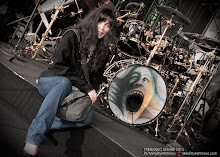Emotion, Creation and Interpretation
A book by
Doctor Osvaldo Fustinoni
Interview & Article: Adriana
Rubio
Press Assistance & Photographs:
Courtesy of El Ateneo & Graciela Bruno
This blog has always been devoted to the arts and has published articles
and interviews of a vast number of artists, rock musicians, actors, film
directors and book authors on a wide scale for several years. This is the first
time Arts Publications Music & Films opens up to the medical field with an
interview to a renowned Argentinian neurologist, Doctor Osvaldo Fustinoni,
who aside from his successful career enjoys playing and listening to classical
and other music. We welcome Doctor Fustinoni and his book titled “Brain
and Music” to this blog as the leading article of a number of
studies that will be exposed here some time soon.
Before to continue, I would like to thank very much El Ateneo and its press representative Graciela Bruno for such a kind and professional assistance.
I also want to thank Doctor Darío
Lisei, a young Neurologist with a bright future who encouraged me to
read this book.
Excerpts
from the prologue:
“Music, whatever its genre, has been part of all peoples and cultures
over centuries. Not essential for survival, though more emotional than other
arts, no people has ever been known to give up music”
“Today brain knowledge and research has attained enormous interest,
enabling us to better understand our behavior toward that most enjoyable human
expression: music”.
Although “ Brain and Music” has been
written by a neurologist, he points out
that the writing of the book was not expressly related to his specialty
in the medical field in the first place.
“The genesis of the book has rather more to do with
other circumstances. We had a colleague in the Society of Neurology who was
also a writer and poet. We were all attending the Annual Congress of Neurology
a few years back and he had the idea of getting together in a different
environment and time frame out of the rigorous scientific activities of the
Congress to share our artistic side with other colleagues who played music,
wrote poetry/fiction or painted art. So
“The Neurology and Art Evening” was created, and new ideas developed
later as a result”.
“Four years ago, another colleague organized a course in a private
University about creativity and the brain, which I do mention in the book,
and asked me to develop the subject of
music and the brain, not only in relation to creativity but also in other
dimensions within the musical context
(composition-interpretation-improvisation-listening)”.
“With the same motivation and
with another colleague, which I also mention in the book, we thought it a good idea to put it all
together in writing. So we first wrote an article for“Ciencia e
Investigación(“Science and Investigation”),
a Journal from Argentina aimed at a broad scientific readership. That
article induced us to develop the subject further into book format".
“The book analyses the relation between brain function and creativity
amongst those who compose/play music or simply enjoy listening. Although it
does not seek to establish a specific relation between disease and
musical creativity, it does mention examples of famous musicians whose musical
talent has been conditioned by brain disease".
“Brain and Music” is a great read and is highly recommended to anyone interested in
knowing more about what happens in our brains when listening to, composing or
playing music, why we enjoy listening to music and what creativity means
amongst many other subjects explained from a different perspective.
“The effect of music on the human brain is predominantly emotional.
Music powerfully stimulates emotion and drives people together. It is a shared experience whatever the genre or style: jazz , rock, or classical concert . We follow
the rhythm with head, hands and feet. But it is still a mystery why some people
like jazz, and others like opera, tango, rock or folk. It probably has to do
with the varieties of emotional experience that music induces".
“Opera,
for example which combines music, literature and drama with commanding voices acting and singing the
story, may drive people to incredible emotional oubursts. One may wonder
whether audiences attending drama without music with a
similar subject, would react in the same way. Music is the great emotion
enhancer”.
“Brain and Music” –Emotion, Creation and Interpretation - is a 192 pages paperback book authored by Doctor
Osvaldo Fustinoni, published in 2015 by El Ateneo. The book
counts with eight chapters filled with amazing topics such as “music and
memory”, “action and reaction”, “listening in colors: Synesthesia”, “musical cognition”,
“music and emotion”, “creation”, “creation and illness”, “interpretation”,
“improvisation” , “listening”, and much more.
Osvaldo Fustinoni is a prestigious doctor from the University
of Buenos Aires and a professor of Neurology at the Medical School-University
of Buenos Aires. He is Head of Neurology
athe National Forensic Corps (Supreme
Court of Justice) in Argentina, and also an Active member of the Argentinian Society of
Neurology. He has worked in the investigation field in France at INSERM
(Institute National de la Santé et de la Recherche Médicale), also in the area
of physiology and vascular physiopathology at Lariboisière Hospital in París.
He was a Postgraduate Fellow from the Institute of Neurology, Queen
Square, in London and worked hand in hand with Prof. John Marshall. Currently,
he is a Member of the Queen Square Alumnus Association. Fustinoni has also
worked at Naval and Fernández hospitals in Buenos Aires, and is consultant at
the Neuroscience Institute of Argentina (INEBA), just to mention a few
accomplishments amongst a very long list of professional titles and
positions.
For more information on how to purchase this book, please contact the
publisher directly at the link below:
Thank you Doctor!




